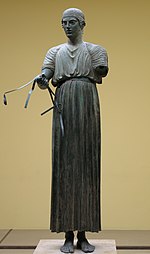Ancient Olympic Games
| Olympic Games |
|---|
 |
| Main topics |
|
| Games |
|
The Ancient Olympic Games were a series of athletic competitions held between the city-states of Ancient Greece. They used to be called the Olympic Games (Greek: Ολυμπιακοί Αγώνες; Olympiakoi Agones) until the modern day Olympic Games started. The Ancient Olympic Games began in 776 BC in Olympia, Greece.[1] Prizes at the games were olive wreaths, palm branches and woollen ribbons. The ancient Olympics were played in the honour of the God Zeus.
Women were not allowed to participate or even to see the competitions.
There is no agreement on when the Games officially ended, but many historians think it is 393 AD, when the Christian Roman emperor Theodosius I declared that all Pagan religious practices should end.[2] Another date might be 426 AD, when the next emperor Theodosius II ordered the destruction of all Greek temples.[3] The stadium in Olympia got buried by landslides and other natural disasters. After the Olympics stopped, they were not held again until the modern Olympic Games were started in 1896 in Athens.
Famous athletes

Here are athletes that competed at the Games:
- from Athens:
- Aurelios Zopyros (Junior boxing)
- from Sparta:
- Acanthus of Sparta (Running: diaulos)
- Chionis of Sparta (Running: stadium, diaulos. Long and Triple Jump)
- Cynisca of Sparta (first woman to be listed as an Olympic victor)
- from Rhodes:
- Diagoras of Rhodes (Boxing 79th Olympiad, 464 BCE) and his sons Akusilaos and Damagetos (Boxing and Pankration)
- Leonidas of Rhodes (Running: stadium, diaulos and hoplitodromos)
- from Croton:
- Astylos of Croton (Running: stadium, diaulos and hoplitodromos)
- Milo of Croton (wrestling)
- Timasitheos of Croton (wrestling)
- from other cities:
- Koroibos of Elis (Stadion)
- Orsippus of Megara (Runner: diaulos)
- Theagenes of Thasos (Pankration)
- non-Greek:
Related pages
References
- ↑ "Ancient Olympic Games". Microsoft Encarta Online Encyclopedia 2006. Microsoft Corporation. June 20, 1997. Archived from the original on May 4, 2006. Retrieved December 27, 2006.
- ↑ However, Theodosius' decree contains no specific reference to Olympia (Crowther (2007), p. 54).
- ↑ Crowther (2007), p. 54
- ↑ Tiberius, AD 1 or earlier - cf. Ehrenberg & Jones, Documents Illustrating the Reigns of Augustus and Tiberius [Oxford 1955] p. 73 (n.78)
- ↑ 369 according to Encyclopedia of Ancient Greece by Nigel Wilson, 2006, Routledge (UK) or 385 according to Classical Weekly by Classical Association of the Atlantic States
Other websites
- The Ancient Olympic Games Virtual Museum (requires registration) Archived 2004-06-02 at the Wayback Machine
- Ancient Olympics (General and detailed information)
- The Ancient Olympics (A special exhibit)
- The Real Story of the Ancient Olympic Games Archived 2008-05-01 at the Wayback Machine
- The Origin of the Olympics
- The Original Olympic Movement Since 776 B.C.
- List of Macedonian Olympic winners (in Greek) Archived 2004-05-17 at Archive.today
- Webquest The ancient and modern Olympic Games Archived 2012-06-18 at the Wayback Machine
